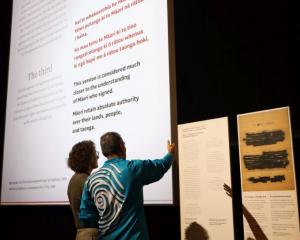A survivor of child sexual abuse finally got justice by secretly recording a call where his offender confessed, six years after he says police didn't think there was enough evidence.
Speaking about his experience for the first time the survivor, who is now a lawyer, said he reported the incident when he was an adult in 2013 but when police interviewed the offender in 2014 he denied the offending and he told the Herald the case was dropped.
"In March 2019 I called the officer on a whim and went through the Prosecution Guidelines with him. I argued that most of the grounds had been met. As a compromise (to his credit) he agreed to let me call the abuser with a bug on my phone to try to obtain a confession. "
It worked, and he said from the time of the confession until the sentencing the detective was "incredible" and kept him in the loop.
His abuser was eventually convicted of abusing the victim in his home when he was a 5-year-old boy.
The survivor is telling his story now because he said while it had a good outcome, his case points to an unequal and discriminatory system.
"Given a lot of victims come from disadvantaged socio-economic backgrounds who would not know how to assess the sentencing guidelines or may not have the confidence to pick up the phone to an authority figure like a policeman."
Ministry of Justice analysis data shows 31 per cent of sexual victimisations reported to police resulted in court action for the perpetrator by early 2019, and 11 per cent resulted in a conviction and 6 per cent had a prison sentence imposed.
The ministry estimates less than 10 per cent of adult sexual violence victimisations are reported to police (according to the 2014 New Zealand Crime and Safety Survey).
Court documents say the abuser violated the victim in 1996.
"You reassured him that what was happening was "okay" and told him not to tell his mother," Judge Michael Turner said at sentencing.
Judge Turner also said that when the offender was interviewed in 2014 about the allegations he denied them.
"However, during a subsequent telephone call between you and the victim in April [of 2019] you apologised for your behaviour."
The document confirmed he was then interviewed by police again and he admitted the offending, unable to explain his conduct.
In regard to the impact on the victim, who spoke at the hearing, Judge Turner said while there were no physical injuries, the psychological and emotional consequences of the offending were pronounced.
"The victim suffers ongoing mental health issues, anxiety and depression in particular, suicidal ideation."
He noted that the survivor's ability to trust others was destroyed and his relationship with his mother was particularly damaged.
"You have given him a life sentence as he told you."
Judge Turner sentenced the man to 12 months' home detention, and ordered him to pay $5000 in emotional harm reparations.
The survivor said this was a conviction that never would have happened if he didn't take the initiative of calling the detective up six years later and begging for another opportunity.
"For every case like mine there would be a hundred others that did not process beyond the initial interview. I do not know how to fix that but it is a really depressing thought."
In a statement, a police spokesperson said there were a number of tactics available to police when investigating reports of sexual abuse.
"Each report made to police is unique, and as such, is investigated on its own merits and using techniques appropriate to each case. The welfare and needs of victims in these matters are of utmost importance and they are supported along the way."
While the survivor said there are victim support staff, they too are time poor, and being passed between police and the Crown can be exhausting and retraumatising.
"Each time I was sharing those details to someone is a difficult conversation and a really vulnerable situation. So I'd like to think having more resources, time for staff to know each victim and their case would make a big difference to victims' comfort during the process. "
He told the Herald he felt disenfranchised from the process and although he was grateful for his outcome, he can't get out of his mind how unlikely a conviction would have been for most people.
"More personally, I have found comfort in getting some form of justice. This is reduced by frustration during sentencing given the errors made by the solicitor. There was no culpability for this and they would have been representing another victim 10 minutes later and potentially making similar mistakes. It was jarring to see these errors presented so casually. "
The man believed the Crown solicitor was not across key details of the case.
He also felt like both the Crown and the defence were trying to persuade him to accept a lesser sentence after the man pleaded guilty, as the defence had threatened to take the case to trial.
"Having the trail presented as a threat by the defence was mildly terrifying. None of it made sense given a confession had already been given."
Not long after a sentence of 12 months home detention was handed down the survivor said the sentence was downgraded to allow the offender to work.
In a statement Ministry of Justice general manager of courts and justice policy Sam Kunowski said one of the reasons sexual violence is reported and prosecuted at lower rates than other crime is the fear and unnecessary trauma that sexual violence complainants can experience in the court process.
"The Sexual Violence Legislation Bill, which is currently awaiting its Committee of the whole House debate in Parliament, aims to reduce that trauma, as well as ensuring the jury's decisions are based on relevant evidence unclouded by myths about sexual violence."
Key changes in the Bill include tightening the rules around evidence about the complainant's sexual history, so details of past sexual encounters with the defendant can only be discussed if they are so relevant that excluding them would be contrary to the interests of justice.
"Judges will also be required to direct juries about common misconceptions, where they are relevant to the case – for example, misconceptions that a complainant is more likely to have consented to sex based on their clothing or the fact they'd had drugs or alcohol beforehand."
Kunowski said the Government has also funded training for prosecutors, defence counsel, and the judiciary on best practice for sexual violence cases.
Sexual harm - Where to get help
If it's an emergency and you feel that you or someone else is at risk, call 111.
If you've ever experienced sexual assault or abuse and need to talk to someone, contact Safe to Talk confidentially, any time 24/7:
• Call 0800 044 334
• Text 4334
• Email support@safetotalk.nz
• Contact HELP04 801 6655
For more info or to web chat visit safetotalk.nz











